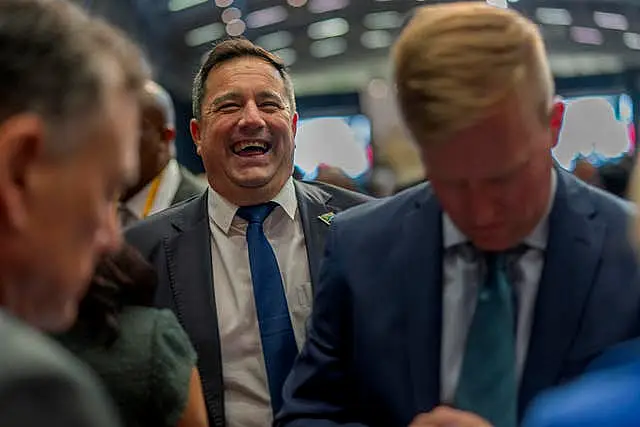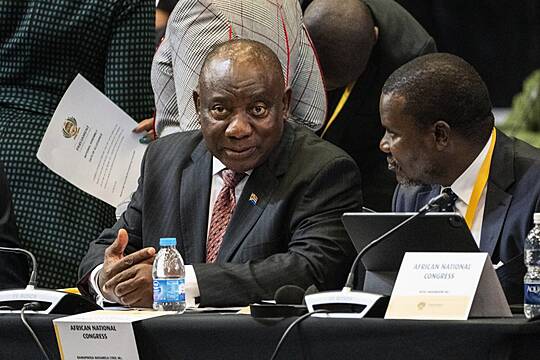South African President Cyril Ramaphosa was expected to be re-elected for a second term on Friday after his African National Congress (ANC) party signed a last-minute coalition agreement with its long-time political rival as the new Parliament convened to choose the country’s leader.
The deal, which parties referred to as a government of national unity, will bring the ANC together in government with the Democratic Alliance (DA), a white-led party that had for years been the main opposition and a fierce foe for the ANC.
At least two other smaller parties will also be part of the agreement that put South Africa into uncharted waters with the first national coalition government in its democratic history.
“The government of national unity is on track,” ANC secretary-general Fikile Mbalula said. “For the interest of the country, we said let’s work together. We have no fear of that.”

The agreement was necessary after the ANC lost its 30-year majority in a humbling national election for it last month. It was a turning point for Africa’s most industrialised economy. The ANC is the party of Nelson Mandela and had governed with a comfortable majority ever since the end of the apartheid system of white minority rule in 1994.
That three-decade dominance ended in the May 29 election, when the ANC’s share of the vote dropped to 40% amid discontent from South Africans over high levels of poverty, inequality and unemployment.
All the parties have said they would put their differences aside to work in the best interests of the country.
However, analysts warned there might be complications ahead given the starkly different ideologies of the ANC, a former liberation movement, and the centrist, business-friendly DA — the two biggest parties and the key players. The DA won 21% of the vote in the national election, the second largest share.
For one, the DA disagreed with the ANC government’s move to accuse Israel of genocide in Gaza in a highly sensitive case at the United Nations’ top court.
DA leader John Steenhuisen was the first to confirm that an agreement was dramatically signed on Friday when Parliament was in a break.
“From today, the DA will co-govern the Republic of South Africa in a spirit of unity and collaboration,” Mr Steenhuisen said as he broke away from the proceedings to make a speech that was carried live on television. He called it an “historic step forward.”
Mr Steenhuisen said the DA would back the 71-year-old Mr Ramaphosa for president and because the two parties have a clear joint majority of seats in Parliament, Mr Ramaphosa’s re-election now appeared to be assured.
The Parliament session first went through the hours-long swearing-in of hundreds of new MPs and electing a speaker and a deputy speaker, before the house set to vote on the president, well into the night. Two candidates were nominated — Mr Ramaphosa and Julius Malema, the leader of the far-left Economic Freedom Fighters party which had refused to join the unity government.

A majority of the votes cast in a secret ballot in the 400-member lower house of Parliament, called the National Assembly, was required to elect a president.
Former President Jacob Zuma’s MK Party was boycotting the session, which did not after the voting as only a third of the house is needed for a quorum.
Parliament convened in an unusual setting after a fire in 2022 gutted the National Assembly building in Cape Town and lawmakers came together at a conference centre near the city’s waterfront.
Two other smaller parties said they would be part of the coalition agreement and Mr Mbalula said the ANC was open to talking with anyone else who wanted to join the unity government.
There are 18 political parties represented in Parliament and Mr Mbalula said the multi-party agreement would “prioritise the country across the political and ideological divide”. Some parties refused to join.
The other two parties to join were the Inkatha Freedom Party and the Patriotic Alliance, which has drawn attention because of its strong anti-immigration stance and because its leader, Gayton McKenzie, served a prison sentence for bank robbery.
“The deal is we are putting South Africa first,” Mr McKenzie said in an interview on state broadcaster SABC. “We are going to work together. We have decided we are not going to let South Africa die in our hands, on our watch.”
The ANC had faced a deadline to get a coalition agreement given parliament had to sit for the first time and vote for the president within 14 days of the election results being declared on June 2.
The ANC had been trying to strike a coalition agreement for two weeks and the final negotiations went through the night Thursday and into Friday, party officials said.
South Africa had not faced this level of political uncertainty since the ANC swept to power in the first all-race election in 1994 that ended nearly a half-century of racial segregation.
The party had held a clear majority in parliament since then, meaning parliamentary votes for the president were formalities and every South African leader since had been from the ANC, starting with Mr Mandela.
This unity government also harked back to the way Mr Mandela, South Africa’s first black president, invited political opponents to be part of a new unity government in 1994 in an act of reconciliation. The ANC’s hand was forced this time.
“The ANC has been very magnanimous in that they have accepted defeat and have said, ‘let’s talk’,” PA leader Mr McKenzie said.







